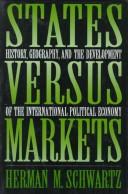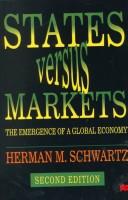| Listing 1 - 10 of 26 | << page >> |
Sort by
|

ISBN: 0809080737 Year: 2002 Publisher: New York (N.Y.) Hill and Wang
Abstract | Keywords | Export | Availability | Bookmark
 Loading...
Loading...Choose an application
- Reference Manager
- EndNote
- RefWorks (Direct export to RefWorks)

ISBN: 0670812706 Year: 1987 Publisher: New York Viking
Abstract | Keywords | Export | Availability | Bookmark
 Loading...
Loading...Choose an application
- Reference Manager
- EndNote
- RefWorks (Direct export to RefWorks)
Book
ISBN: 9780230521285 9780230521339 0230521339 0230521282 Year: 2010 Publisher: Basingstoke Palgrave Macmillan
Abstract | Keywords | Export | Availability | Bookmark
 Loading...
Loading...Choose an application
- Reference Manager
- EndNote
- RefWorks (Direct export to RefWorks)
"States versus Markets shows that globalization is not a novel phenomenon but a recurrent process whereby markets have, since the sixteenth century, periodically redistributed economic activity. This revised and updated new edition takes account of the new rise of Asia and the global financial crisis originating in the US housing finance system"--Provided by publisher.
Industrial economics --- International economic relations --- Industrial policy --- Commercial policy --- Commercial policy. --- Industrial policy. --- International economic relations. --- 337 --- Foreign trade policy --- International trade --- International trade policy --- Trade policy --- Economic policy --- Business --- Industries --- Industry and state --- Economic policy, Foreign --- Economic relations, Foreign --- Economics, International --- Foreign economic policy --- Foreign economic relations --- Interdependence of nations --- International economic policy --- International economics --- New international economic order --- International relations --- Economic sanctions --- Government policy

ISBN: 0333618521 Year: 1994 Publisher: Basingstoke London MacMillan Press
Abstract | Keywords | Export | Availability | Bookmark
 Loading...
Loading...Choose an application
- Reference Manager
- EndNote
- RefWorks (Direct export to RefWorks)
Commercial policy --- Droit international économique --- Droit économique (Droit international) --- Droit économique international --- Economic policy [Foreign ] --- Economic relations [Foreign ] --- Economics [International ] --- Economische betrekkingen [Internationale ] --- Foreign economic policy --- Handelspolitiek --- Industrie en Staat --- Industrie et Etat --- Industry and state --- Interdependence of nations --- International economic policy --- International economic relations --- International economics --- Internationale economische betrekkingen --- New international economic order --- Politique commerciale --- Relations économiques internationales --- 338.22 --- 339 --- AA / International- internationaal --- 321.2 --- 330.00 --- Economische organisatieleer. Economisch beleid. Economische politiek --- Handel. Internationale economische betrekkingen. Wereldeconomie --binnenlandse als buitenlandse handel; zie ook {339.3} en {339.5} --- Economisch beleid van de overheid. --- Economische en sociale theorieën: algemeenheden. --- 339 Handel. Internationale economische betrekkingen. Wereldeconomie --binnenlandse als buitenlandse handel; zie ook {339.3} en {339.5} --- 338.22 Economische organisatieleer. Economisch beleid. Economische politiek --- Industrial policy --- Foreign trade policy --- International trade --- International trade policy --- Trade policy --- Economic policy --- Economic policy, Foreign --- Economic relations, Foreign --- Economics, International --- Foreign economic relations --- International relations --- Economic sanctions --- Business --- Industries --- Economisch beleid van de overheid --- Economische en sociale theorieën: algemeenheden --- Government policy

ISBN: 9780333802632 9780333802625 0333802632 0333802624 Year: 2000 Publisher: Basingstoke Macmillan
Abstract | Keywords | Export | Availability | Bookmark
 Loading...
Loading...Choose an application
- Reference Manager
- EndNote
- RefWorks (Direct export to RefWorks)
Commercial policy. --- International economic relations. --- Industrial policy. --- Politique commerciale --- Relations économiques internationales --- Politique industrielle --- International economic relations --- Industrial policy --- Commercial policy --- #SBIB:002.AANKOOP --- #SBIB:327.1H10 --- #SBIB:33H072 --- Foreign trade policy --- International trade --- International trade policy --- Trade policy --- Economic policy --- Business --- Industries --- Industry and state --- Economic policy, Foreign --- Economic relations, Foreign --- Economics, International --- Foreign economic policy --- Foreign economic relations --- Interdependence of nations --- International economic policy --- International economics --- New international economic order --- International relations --- Economic sanctions --- Internationale betrekkingen: theorieën --- Wereldmarkten --- Government policy --- Relations économiques internationales
Book
ISBN: 9780801448126 0801448123 9780801475672 0801475678 0801459273 Year: 2009 Publisher: Ithaca : Cornell University Press,
Abstract | Keywords | Export | Availability | Bookmark
 Loading...
Loading...Choose an application
- Reference Manager
- EndNote
- RefWorks (Direct export to RefWorks)
In his exceedingly timely and innovative look at the ramifications of the collapse of the U.S. housing market, Herman M. Schwartz makes the case that worldwide, U.S. growth and power over the last twenty years has depended in large part on domestic housing markets. Mortgage-based securities attracted a cascade of overseas capital into the U.S. economy. High levels of private home ownership, particularly in the United States and the United Kingdom, have helped pull in a disproportionately large share of world capital flows. As events since mid-2008 have made clear, mortgage lenders became ever more eager to extend housing loans, for the more mortgage packages they securitized, the higher their profits. As a result, they were dangerously inventive in creating new mortgage products, notably adjustable-rate and subprime mortgages, to attract new, mainly first-time, buyers into the housing market. However, mortgage-based instruments work only when confidence in the mortgage system is maintained. Regulatory failures in the American S&L sector, the accounting crisis that led to the extinction of Arthur Andersen, and the subprime crisis that destroyed Lehman Brothers and Merrill Lynch and damaged many other big financial institutions have jeopardized a significant engine of economic growth. Schwartz concentrates on the impact of U.S. regulatory failure on the international economy. He argues that the "local" problem of the housing crisis carries substantial and ongoing risks for U.S. economic health, the continuing primacy of the U.S. dollar in international financial circles, and U.S. hegemony in the world system.
Financial crises --- Subprime mortgage loans --- Housing --- Credit --- International finance. --- Capital market. --- Finance. --- United States --- Economic conditions --- Foreign economic relations. --- Capital market --- International finance --- 332.0420973 --- 339.115 --- US / United States of America - USA - Verenigde Staten - Etats Unis --- Borrowing --- Finance --- Money --- Loans --- International monetary system --- International money --- International economic relations --- Capital markets --- Market, Capital --- Financial institutions --- Money market --- Securities --- Crowding out (Economics) --- Efficient market theory --- Buitenlandse schuld. Debt Equity Swap in LDC
Year: 1957 Publisher: London Staples Press
Abstract | Keywords | Export | Availability | Bookmark
 Loading...
Loading...Choose an application
- Reference Manager
- EndNote
- RefWorks (Direct export to RefWorks)
Book
ISBN: 9781352004434 1352004437 9781352004472 135200447X Year: 2019 Publisher: London: Bloomsbury academic,
Abstract | Keywords | Export | Availability | Bookmark
 Loading...
Loading...Choose an application
- Reference Manager
- EndNote
- RefWorks (Direct export to RefWorks)
Now in its fourth edition, this highly regarded and critically acclaimed textbook offers an authoritative introduction to international political economy. It is unique in offering an accessible, broad introduction to the development of the global economy from its inception to today's complex relationship between states and markets in the midst of economic crises. Herman Mark Schwartz deftly shows that globalization is not a novel phenomenon but a recurrent process whereby markets have, since the 16th century, periodically redistributed economic activity. It links the production of goods and services in one region to the markets for those goods, and shows how this can lead to conflicts among states that try to create, enhance or subdue the markets. Taking into account the continued rise of China, and the recent shift towards populism in the West, this book has been extensively rewritten and updated throughout. This is a thought-provoking text which will encourage upper level undergraduate and postgraduate students to think analytically about the inevitability of a global market influencing a state's policies and geo-economic position and to locate their own thinking within the IPE tradition. New to this Edition: Thoroughly updated to cover all major developments in global political economy since the financial crisis ; Timelines in most chapters show key events in the evolution of the global economy ; Offers a particularly clear account, now with chapter summaries, updated examples and a glossary of key terms.
International economic relations --- Industrial policy --- Commercial policy
Book
ISBN: 0801422701 Year: 1989 Publisher: London Cornell University Press
Abstract | Keywords | Export | Availability | Bookmark
 Loading...
Loading...Choose an application
- Reference Manager
- EndNote
- RefWorks (Direct export to RefWorks)
Book
Year: 1957 Publisher: London Staples Press
Abstract | Keywords | Export | Availability | Bookmark
 Loading...
Loading...Choose an application
- Reference Manager
- EndNote
- RefWorks (Direct export to RefWorks)
| Listing 1 - 10 of 26 | << page >> |
Sort by
|

 Search
Search Feedback
Feedback About UniCat
About UniCat  Help
Help News
News